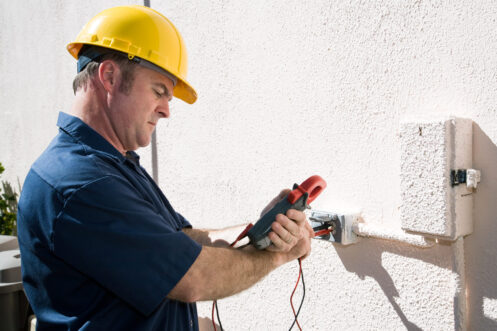
The winter season brings holidays, festivities, unique outdoor activities, and picturesque scenery. However, wintertime can also bring cold temperatures and precipitation that can have a negative impact on your home’s electrical system. For example, winter storms can cause power outages, and increased use of appliances can result in tripping breakers. Even the type of lighting and decor used during the winter can raise the risk of electrical fires. Since electrical systems play an integral role in the daily operation of your home, it is important to understand seasonal challenges and take precautionary steps to handle dangers or risks. A look at the top ways that winter weather impacts your electrical system can provide guidance for troubleshooting these issues during the coldest months of the year.
Flickering Lights
During the winter, you may notice lights in your home flickering more frequently. Winter storms and inclement weather can force power lines on the grid to sway back and forth. Moreover, sudden lightning strikes can also impact the functionality of the grid and cause fluctuations in electrical current. Any changes to the power grid can cause lights to flicker in the home. In addition to the outdoor weather, lights can also flicker due to loosened connections and wiring indoors. A trained electrician can conduct an inspection to determine whether the issue is with a fixture or the electrical system itself. If the flickering impacts just one bulb, the problem is often with the fixture. But if all lights flicker when you plug in a major appliance or use a large device, you may have a problem with overloading as you attempt to pull more power than the system can provide. An electrician can diagnose the issue to help prevent blowouts or other problems.
Power Outages
Harsh winter weather can also increase the number of potential power outages. For example, strong winds and heavy precipitation can force grid lines to touch. This disrupts the grid’s distribution of electrical current. In addition, fallen power lines within the neighborhood can also cause power outages. Within your own property, be sure to hire a professional to trim trees and avoid letting long branches touch power lines. Many local jurisdictions have rules that require residents to keep trees, buildings, and roofs at least 10 feet from power line sources.
If it is too late and power lines have already collapsed or sagged due to a storm or blizzard, stay at least 30 feet away from the affected location and wait for the electrical company to repair the issue. Never touch a fallen power line or attempt to move items surrounding it. Given the combination of ice and wiring, fallen grid lines can cause sparks or electrocution. It is always better to be safe than sorry. If your neighborhood experiences frequent outages, talk to an electrician about installing a whole-house generator. Depending on the model, a whole-home generator can detect outages and turn on automatically, thereby ensuring the home remains empowered and warm. Professionally installed generators are also much safer than portable or gas units.
Power Surges and Breaker Problems
The arrival of winter can also increase the number of appliances used for heating, cooking, and indoor entertainment. Unfortunately, an outdated circuit breaker may trip more frequently due to excessive power demands from the electrical system. Sudden outdoor power surges can also cause the breaker box to trip. This tripping mechanism is often a safety measure that helps prevent overheating or electrical fire. Contact an electrician to inspect the circuit breaker and perform upgrades as needed. For example, an electrician can ensure that the new breaker box has the correct amperage to handle larger appliances. The electrician can also check for signs of rust or corrosion to ensure that there are no sources of moisture that constitute a fire hazard. If your neighborhood experiences frequent power surges, you may also ask about installing a whole-home surge protector to help prevent damage to your system or electronic equipment.
Burnt-Out Light Bulbs
Overloaded circuits and winter moisture can also lead to burnt-out light bulbs. Outdated incandescent bulbs are more susceptible to burnouts. You may even encounter blown light bulb if you accidentally overload the circuit when plugging in a Christmas tree. Many experts recommend replacing conventional lights with light-emitting diodes (LEDs) for the winter. According to the Department of Energy, residential LEDs use 75% less electricity than incandescent lights and can last 25 times longer. In fact, the average LED can provide up to 50,000 hours of light. LEDs are also much cooler than incandescent lights, thereby reducing the risk of accidental combustion or burns. And because LEDs contain no mercury, they are the far safer alternative to conventional fluorescent bulbs.
Frayed or Outdated Wiring
Electrical wiring can deteriorate for multiple reasons. Depending on the location, for example, excess moisture can degrade and endanger wiring. Damp areas of older homes can also attract rodents that chew through electrical wires and create extensive damage over time. In addition, frequent circuit overloads can cause the insulation over wiring to melt and deteriorate. As a further complication, the missing insulation can result in a short circuit when wires overheat and touch.
If you notice frayed wiring, it is important to contact an electrician right away.
According to the National Fire Prevention Association (NFPA), over 13% of electrical fires result from preventative wiring issues. Each year, fire departments respond to around 46,500 house fires in the U.S., and more home fires occur during the winter than any other season. Even if you do not notice frayed wiring, an older electrical system means that your wiring requires upgrades. For example, systems that are over 30 years old or use aluminum or knob-and-tube wiring can increase the risk of fire hazards. Professional electricians can update this wiring to keep your family safe during the winter.
Outdated Electrical Outlets
Electrical problems can also result from attempting to use defective or outdated outlets during the winter. Stop using an outlet if you notice discoloration, sparking, or buzzing from the socket. Defective outlets can also feel warm to the touch. Instead of using the outlet, contact an electrician to prevent problems like fires or electric shock. And while some homeowners may attempt to compensate for missing outlets by using extension cords, these cords can be dangerous when they do not match the power rating of your appliance. Extension cords are also tripping hazards.
Instead of pulling out a bunch of unsafe cords that can overload your circuit breaker, ask an electrician to install upgraded outlets instead. For example, some parts of the home can accommodate ground outlets that allow excess energy to dissipate underground and can help prevent electrocution. An electrician can also install ground fault circuit interrupter (GFCI) outlets in your bathroom. These devices help stop the flow of electricity if a unit has come in contact with water. Many municipalities require GFCIs in the home. If you do not have them, you should schedule an installation with an electrician before the onset of winter.
Contact Us Today
Winter weather can have a detrimental effect on your home’s electrical system. Fortunately, trained professionals are here to help. Black-Haak provides electrical services for homes in Fox Valley, WI and surrounding areas. Our electricians can inspect your panel and repair lighting, wiring, or outlets. We can install generators and also perform generator maintenance. If you are dealing with power surges, let our experts install a surge protector in the home. We can even set up electric vehicle (EV) charging. No matter the issue, our electricians can help. Contract Black-Haak today for all your electric needs.

